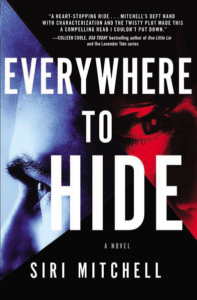Author Siri Mitchell has come out with a new suspense title in Everywhere to Hide (Thomas Nelson), where her protagonist, Whitney Garrison, lives with an unusual neurological condition that puts her in grave danger after she witnesses a murder. In our exclusive interview, Siri shares with us her goals in writing the new thriller, reveals how her faith influences her writing about crime and danger, and explains her greatest challenge in writing the novel.
What were your goals in writing Everything to Hide?
I really wanted my readers to be able to see what it’s like to live in a world that’s not set up for you. What it feels like to play by rules that seem to work for everyone else but only serve to hold you back. Sometimes a person can do all the right things and still find themselves living on the edge. But, honestly, my overarching goal? To give my readers another page-turning thriller!
Your protagonist, Whitney Garrison, is dealing with a neurological condition. Tell us a little about it.
My protagonist represents the 2-percent of the population that has a condition called prosopagnosia (or face blindness). It affects the part of the brain which maps facial features and then stores those memories. A person with face blindness might remember that someone wears glasses or has a beard or a mustache. Hair color and hairstyles might also be remembered, but the memory of how facial features relate to each other is absent.
A person can be born with this condition or it can be acquired from a head injury or trauma. Some people who think they have trouble remembering names actually have trouble remembering faces.
Face blindness exists on a spectrum. Those with the condition can also have difficulty in mapping geography, noting differences in skin color, and distinguishing within groupings of similar objects such as cars.
As a suspense author, how does your faith influence how you approach writing about crime and danger?
I think a lot of us believe the myth that if you’re a good person then bad things won’t happen to you. That if you do everything you’re supposed to do, then God will like you and everything will work out alright. (The corollary, of course, would be that if bad things happen to you then God doesn’t like you. And I don’t think any of us believe that.)
Life isn’t academic; it’s not a decision tree. As it says in Ecclesiastes, time and chance happen to us all. There is evil in this world that causes collateral damage even to nice people. Can God use those situations for some good? Of course. That’s His superpower.
But I do believe in justice. In this world or the next, the bad guys will receive consequences for their actions. In the end, God wins. I like to think that my suspense novels end with a glimpse of that hope.
What did you find to be the most challenging part in writing this book?
 Because I write from the first-person point of view, I place myself in my character’s head when I tell my stories. Since my main character, Whitney, couldn’t recognize the villain (due to her face blindness), I couldn’t either. I could only see the things that she could see and I only knew the things that she did. Because of this, through most of my drafts of this story, even I didn’t know who the villain was!
Because I write from the first-person point of view, I place myself in my character’s head when I tell my stories. Since my main character, Whitney, couldn’t recognize the villain (due to her face blindness), I couldn’t either. I could only see the things that she could see and I only knew the things that she did. Because of this, through most of my drafts of this story, even I didn’t know who the villain was!
Careful readers will note that I didn’t describe characters by reference to their faces or convey character interactions using facial body language (at least I hope I didn’t!). By taking those tools out of my writing toolbox, I realized just how much I had relied on those for character development and to add color and description to my stories in the past. Writing without those tools was a big challenge for me.
What are the spiritual themes you’re exploring in Everywhere to Hide?
In our society, whether we like to admit it or not, money is how we measure success. (Looked at from another angle, of course, not having money can then be interpreted as a character flaw.) This book looks at what happens when the love of money runs amok and what damage is done to those who get left behind in that pursuit.
At one point, Jesus was specifically asked what he valued. I love that his answer had nothing to do with personal freedoms or material success. Instead, he made us responsible to each other. He challenged us to lift our own sights higher. He asked us to love others as we love ourselves.
If we could do a better job of loving each other then I think our society could work better for all of us.
Visit Siri Mitchell’s Author Page:
https://www.familyfiction.com/authors/siri-mitchell

Everywhere to Hide
Siri Mitchell
Thomas Nelson
Buy the book from our store!


